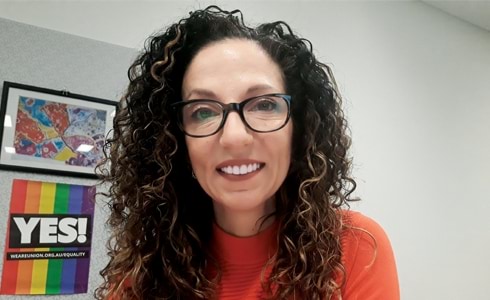- Published:
- Tuesday 1 October 2019 at 5:11 pm
Giving a voice to the unheard
A love for advocacy
A hard-working member of our Independent Mental Health Advocacy (IMHA) team, Advocate Kat Georgakopoulos has always been passionate about assisting the marginalised and those without a voice.
‘My previous roles have seen me working in the alcohol and drug sector in both long-term rehabilitation and detox centres.
‘A large portion of my past work was also focused on youth work and counselling, assisting refugees at the Migrant Resource Centre access settlement programs and working as a case manager for the Court Integrated Services Program, which aims to reduce the likelihood of people re-offending by assisting them in accessing support services.
‘All my life I have advocated for people to have access to support services and the right to housing, food, employment and to feel part of a community,’ she said.
Kat’s diverse job experiences have also reinforced her belief that mental health plays a crucial role in how people’s lives unfold.
‘Poor mental health is often a common thread amongst people struggling in life, and this leads to subsequent issues with housing, alcohol and drugs and contact with the criminal justice system.
‘Understanding mental health and how it affects individuals, families and communities has been a very personal journey for me.
‘People need to understand that it’s not just "poor life choices" that causes mental health issues, and often it’s not a "choice" at all. Rather, it’s a combination of events that leads to a path of lifelong recovery for some.
‘I believe that the public discourse about mental health is often what I would still call victim blaming and fear campaigning.
‘We often hear in the headlines of tragic incidents involving a person with mental health issues, the risk people with mental health pose to our communities. However, the media often fail to mention attempts by the person and their family to access mental health support services, often without success.
‘Unfortunately, access to support services is not always straight forward, and if there is no access to support it can impact not just the individual, but their families and the community around them.’
An insight into the role
Kat believes the role of an IMHA advocate is as diverse as it is challenging.
‘IMHA provides advocacy support to people who are being treated under the Mental Health Act 2014 on involuntary treatment orders.
‘On the ground this involves working directly with consumers (on the phone and face-to-face in the hospitals), providing information about consumer rights under the Act, providing representational advocacy and liaising with treating teams supporting the consumer’s right to have their individual needs recognised. These individual needs may relate to culture, language, disability, religion, gender, sexuality or other matters.
‘I also facilitate information sessions in hospital and mental health clinics to support increasing knowledge about the changes to the Mental Health Act in 2014, which include decision-making mechanisms that support the consumer’s right to participate in every aspect of their recovery and treatment.
‘These mechanisms include access to IMHA advocacy, Mental Health Tribunal hearings, Advance statements and Nominated persons as well as Second psychiatric opinion services. Supporting consumers to have access to this information is vital to supporting their rights while they are on involuntary treatment orders.
‘The role also involves providing a lot of emotional support and really listening to the consumer’s needs. Often being presumed as not having capacity means that consumers are frequently ignored and not heard, and my primary role is to always ensure that the consumer’s voice is heard and understood.’
Benefits and challenges of the role
Like any role, the job of IMHA advocate has many challenges, but Kat sees them as insignificant when compared to the benefits.
‘The challenges of the role are varied, and it’s certainly trying at times to maintain and build relationships with services while challenging practice methods.
‘The role requires having frank discussions and challenging the status quo through supporting changes that adopt supported decision mechanisms and the principles of the Mental Health Act.
‘Other challenges include limited resources. I am often asked to attend hospitals more frequently, but unfortunately this is not possible as IMHA is a state-wide service, and satisfying demand is near impossible.
‘The most significant challenge for me personally is reflecting on the experiences of the consumers I work with, and seeing how they are treated, spoken to and dismissed.
‘Sitting with them in their anguish can be difficult at times, but this also motivates me to continue to provide essential advocacy support and influence change in mental health services.’
Making a difference
Whilst there is no formula for success in mental health, Kat believes attending review meetings – where a consumer is reviewed by their psychiatrist regarding their treatment and evaluated as to whether they meet the criteria to be on a treatment order – is a good start.
‘Being present with the consumer and the consultant is where advocates can be most influential, as an advocate’s presence alone can change how a conversation progresses between consumer and psychiatrist.
‘Participating in the conversation, supporting the consumer to have their say and highlighting the person’s rights under the Act is very effective.
‘Consumers often feel they are being coerced to agree to treatment, and feel they have no choice, no options and no rights.
‘Being part of these conversations allows for the consumer’s choices and preferences to be part of the conversation, and most importantly, not be dismissed. It provides for a dialogue that reflects and respects the principles of the Mental Health Act and empowers the consumer.
‘And of course, the role supports consumers with having as much say in their mental health treatment by providing a directional-based advocacy service.
‘Advocates only take direction from the consumer, thereby supporting the consumer to have their say in all aspects of their treatment and recovery.
‘Often the consumer will walk out with a treatment plan that they feel they have had choice over, feel more involved in and feel satisfied that it’s more about them and their recovery goals.
‘It’s in these moments that I feel I’ve made a difference.’
IMHA’s role in expanding public awareness of mental health
Kat believes this year’s Mental Health Week theme of ‘Mental Health, 'What do you know?’, is very relevant to her role.
‘Every day in this role, I am presented with opportunities to expand my awareness and understanding of mental health, as well as the opportunity and responsibility to share these learnings with others.
‘I believe that the conversations are becoming more robust, and I am always willing to have discussions with people about mental health.
‘Challenging people’s perceptions and understandings of mental health is what will result in changed thinking.
‘I can’t say I know it all, but I do know that talking openly and having consumer led discussions allows for a more informed discussion about mental health.
‘And of course, IMHA is an inclusive and truly consumer directed platform which provides a significant opportunity to raise awareness about mental health.’
More information
Read more about your rights and what the law says about mental illness.
Updated


